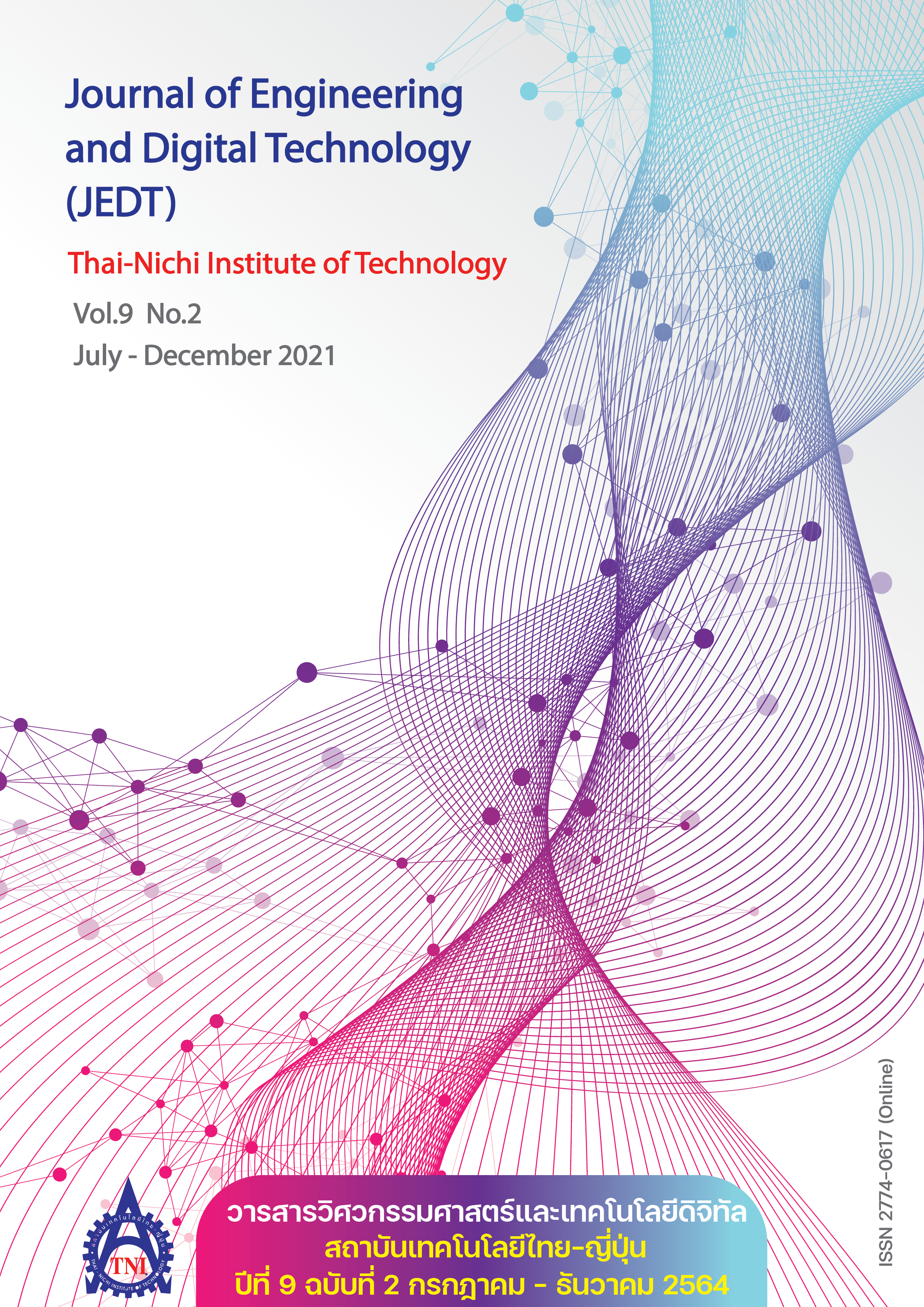The Design and Development of Public Bus Complaint Classification Process for Service Problem Tagging
Main Article Content
Abstract
Bangkok Mass Transit Authority (BMTA) has a webboard for service user complaints on public buses. This information is important and improving service efficiency. Now, the complaints are increasing, more different and lexical error problem affect the accuracy of the complaints classification. Because the person has to analyze the data by self. This research aims 1) to the design and development of public bus complaint classification process from BMTA webboard by Thai dictionary-based approach and keywords selection by TF-IDF to create a corpus-based divided into 4 classes: driving class, person class, vehicle class and schedule class. The result of text classification algorithms, found that it was at a very good level. 2) to evaluation the accuracy of the public bus complaint classification. Then, keywords matching with user complaints again and increase the accuracy of keywords by Levenshtein Distance. In case that found the incorrectly keywords for create complaint classification tag. The accuracy assessment of complaint classification is a very good level, especially one complaint issue. The results show performance of dictionary-based approach on Thai word segmentation is suitable for the terminology that has definite scope. However, found problems in same keywords to be duplicated in some class. For example, loudness can be attribute from the person class or the vehicle-equipment class according to the origin of the sound. As well as the unique compounding of Thai language affects to the accuracy of word tokenization. These results will present an approach to data classification and will benefit to those responsible to improve the service for customers.
Article Details

This work is licensed under a Creative Commons Attribution-NonCommercial-NoDerivatives 4.0 International License.
Article Accepting Policy
The editorial board of Thai-Nichi Institute of Technology is pleased to receive articles from lecturers and experts in the fields of engineering and technology written in Thai or English. The academic work submitted for publication must not be published in any other publication before and must not be under consideration of other journal submissions. Therefore, those interested in participating in the dissemination of work and knowledge can submit their article to the editorial board for further submission to the screening committee to consider publishing in the journal. The articles that can be published include solely research articles. Interested persons can prepare their articles by reviewing recommendations for article authors.
Copyright infringement is solely the responsibility of the author(s) of the article. Articles that have been published must be screened and reviewed for quality from qualified experts approved by the editorial board.
The text that appears within each article published in this research journal is a personal opinion of each author, nothing related to Thai-Nichi Institute of Technology, and other faculty members in the institution in any way. Responsibilities and accuracy for the content of each article are owned by each author. If there is any mistake, each author will be responsible for his/her own article(s).
The editorial board reserves the right not to bring any content, views or comments of articles in the Journal of Thai-Nichi Institute of Technology to publish before receiving permission from the authorized author(s) in writing. The published work is the copyright of the Journal of Thai-Nichi Institute of Technology.
References
Bangkok Mass Transit Authority, “Annual Report 2019,” (in Thai), Bangkok Mass Transit Authority, Bangkok, Thailand, 2019.
Mahidol University, “Final Report: User Satisfaction Survey 2018,” (in Thai), Bangkok Mass Transit Authority, Bangkok, Thailand, 2018.
Office of Transport and Traffic Policy and Planning. “The number of passengers on the BMTA bus.” MISTRAN.otp.go.th. http://mistran.otp.go.th/mis/Interview_HIPubilcBus.aspx (accessed Aug. 20, 2021).
The Office of the Permanent Secretary, The Prime Minister's Office, “Complaint/Opinion Processing Results Quarter 1 Fiscal Year 2021,” (in Thai), The Office of the Permanent Secretary, The Prime Minister's Office, Bangkok, Thailand, 2021.
Department of Land Transport, “Transport Statistics report 2020,” (in Thai), Transp. Statist. Group, Planning Div., Dep. Land Transp., Bangkok, Thailand, 2020.
C. C. Aggarwal, Data Classification Algorithm and Applications. Boca Raton, FL, USA: CRC Press, 2015.
M. Wozniak, Hybrid Classifiers Methods of Data, Knowledge, and Classifier Combination. Heidelberg, Germany: Springer-Verlag, 2014.
S. McConnell, Rapid Development: Taming Wild Software Schedules. Washington, DC, USA: Microsoft Press, 1996.
R. Mitchell, Web Scraping with Python: Collecting Data from the Modern Web. Sebastopol, CA, USA: O'Reilly Media, 2015.
C. Tapsai, H. Unger and P. Meesad, Thai Natural Language Processing Word Segmentation, Semantic Analysis, and Application. Cham, Switzerland: Springer International Publishing, 2021.
C. D. Manning, P. Raghavan and H. Schütze, Introduction to Information Retrieval. Cambridge, UK: Cambridge University Press, 2018.
T. Jo, Text Mining Concepts, Implementation, and Big Data Challenge. Cham, Switzerland: Springer International Publishing, 2019.
T. Kwantler, Text mining in practice with R. West Sussex, UK: John Wiley & Sons, 2017.
J. Zizka, F. Darena and A. Svoboda, Text Mining with Machine Learning Principles and Techniques. Boca Raton, FL, USA: CRC Press, 2020.
F. J. Damerau, “A technique for computer detection and correction of spelling,” Commun. ACM, vol. 7, no. 3, pp. 171–176, Mar. 1964.
J. Grudin, “Non-hierarchic specification of components in transcription typewriting,” Acta Psychol., vol. 54, no. 1-3, pp. 249–262, Oct. 1983.
K. Kukich, “Techniques for automatically correcting words in text,” ACM Comput. Surv., vol. 24, no. 4, pp. 377–439, Dec. 1992.
V. I. Levenshtein, “Binary codes capable of correcting deletions insertions, and reversals,” Dokl. Phys., vol. 10, no. 8, pp. 707–710, Feb. 1966.
F. P. Miller, A. F. Vandome and J. McBrewster, Levenshtein Distance Information theory, Computer science, String (computer science), String metric, Damerau-Levenshtein distance, Spell checker, Hamming distance. Gladbach, Germany: Alphascript Publishing, 2009.
J. Martinez, Google Charts for Institutional Research Websites. Houston, TX, USA: University of Houston, 2018.
C. O. Wilke, Fundamentals of Data Visualization: A Primer on Making Informative and Compelling Figures. Sebastopol, CA, USA: O’Reilly Media, 2019.


